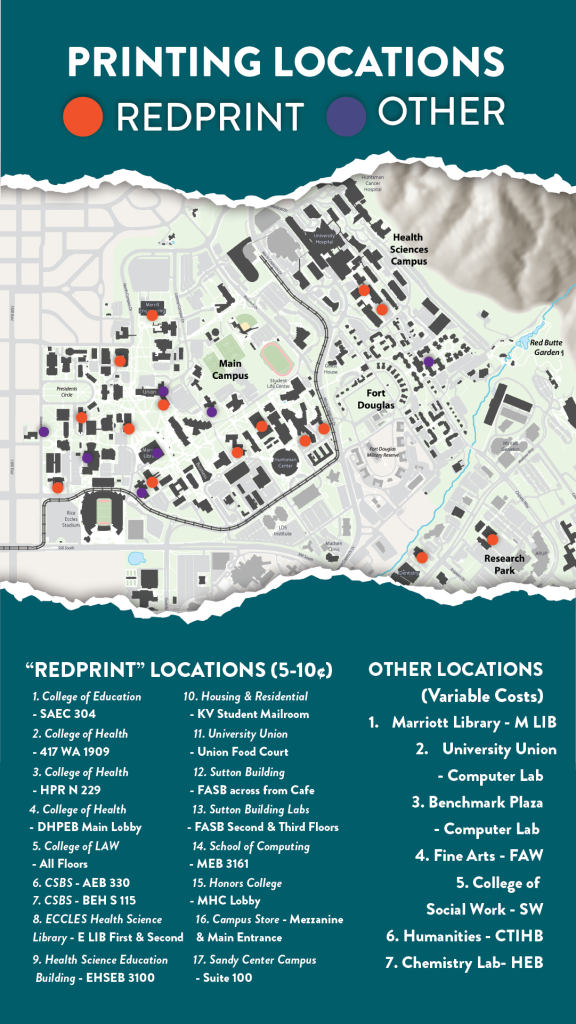 From now on, the $2 printing credits will be available to students at the beginning the fall semester. They are also available through the spring.
From now on, the $2 printing credits will be available to students at the beginning the fall semester. They are also available through the spring.
Muskan Walia, a first-year student, and CJ Reid, a second-year student, both faced a common problem in 2020: printing long documents for their class. Walia, Reid and their classmates quickly accumulated the costs and had to top up their UCards multiple times over the course of a year.
They acted immediately by joining the First-Year Council. This group of representatives from the Associated Students of the University of Utah is made up of first-year students.
The students found an outlet to voice their concern, and they enlisted other students who were also passionate about the issue. Together, they embarked upon a mission to gather information about printing services offered on campus and to devise a strategy to offer free printing for students.
“I remember struggling during my freshman year, trying to print those lengthy exams and feeling like there had to be a better way,” said Walia. This experience motivated me to make printing affordable and accessible for all students. It’s incredibly gratifying to see our efforts culminate in this initiative that will benefit thousands of students at the University of Utah.”
The program’s implementation was not without its challenges. Concerns from student government legislators, compounded with infrastructural challenges, leaving Walia and Reid’s goals out-of-reach for their first year. During their summer break they worked with UCard Services partners to draft new legislation. Bryon Buchmiller and Ron Wells, partners, both senior systems administrators, evaluated a potential restructure of UCard’s backend in order to achieve their goals.
The ASUU provided funding for the new initiative during the first 2 years of the program (2021-2023), which was intended to be temporary. Credit was applied to all fee paying students, including undergraduates and graduate students. Walia, Reid and their team collected information on student printing needs and usage during this period. They continued to meet the UCard Services Office to analyze the data on printing and refine the program based upon real-world outcomes.

Click to enlarge
Data showed that campus printing costs were not as high as people thought. Campus-wide printing costs peaked at approximately $101,000 in 2018, and then dropped to $92,000 in 2019 in the years before the pandemic. The cost of printing campus-wide dropped to just $55,000 by 2020, as the pandemic affected normal campus operations.
As campus returned to “normal operations” in the 2021-22 academic year, they gathered fresh data that indicated only 23% of students spent more than $5 on printing during the spring semester. The program only cost $3,800 during that spring semester. That was much less than the students had anticipated.
Walia, Reid, and their team had compiled a dataset that demonstrated the need for the University to fully fund $2.00 in free printing per student. This academic year saw the culmination of all their efforts as the program transitioned officially from a Student Initiative to a University Funded Program.
Walia and Reid now have a partner in Jenn Reid. She is the associate vice-president for Auxiliary Services. Buchmiller and Wells, from the UCard offices, are also partners.
In March 2023 the students presented their data and made a compelling case for the University to cover the cost of free printing. Reed included this initiative into her budget proposal after consulting with her team and reviewing the data.
“Looking for ways to increase student resources is crucial for a more equitable and accessible campus. This program is a meaningful step towards that goal and it’s incredibly exciting that the University is providing this resource for students. This 4-year initiative absolutely You can learn more about it heren’t easy, but it was possible because Ron, Bryon, and Jenn were not only supportive, but empowering and collaborative—something for which we cannot thank them enough,” said Reid.
Together they focused on the technical aspects of the program, ensuring its seamless implementation. Reed also ensured that the relevant departments were informed of the university’s commitment to providing this essential service.
“This initiative not only eases the financial burden on students but also exemplifies the power of student-led change and the university’s commitment to enhancing the student experience,” said Reed.
Today, the University is more equipped than ever before to support the academic successes of its diverse students, ensuring printing materials don’t stand in the learning journeys of these students.
To read Walia and Reid’s legislation that was approve by their peers, Click Here.




